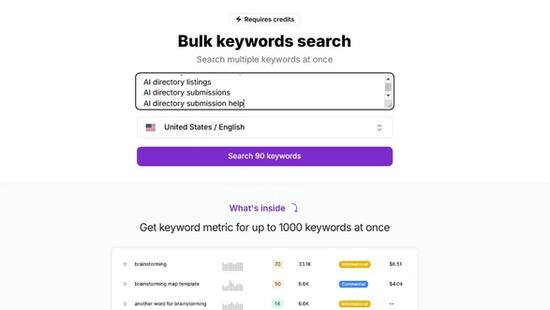
Mastering Bulk Keyword Analysis: Expert Strategies for 2025
 Carlos Garcia1/24/2025
Carlos Garcia1/24/2025Mastering Bulk Keyword Analysis: Expert Strategies for 2025
When you're dealing with hundreds or thousands of keywords, you need a good system to make sense of it all.
This guide walks through how to organize, analyze, and use large keyword lists effectively.
Using the right bulk keyword analysis strategies can save time and uncover valuable insights for your SEO efforts.
Getting Started with Keyword Analysis
Why Look at Lots of Keywords Together?
Think of it like sorting through a huge pile of Lego bricks. It's much easier if you have a system. When you analyze keywords in bulk, you can:
- Save time by processing many keywords at once
- Spot patterns you might miss when looking at single keywords
- Find hidden opportunities others might overlook
- Make smarter decisions about what content to create
Tools That Help
Several tools can make bulk keyword research easier:
SEO Stuff Bulk Analyzer
- Strengths: Simplifies grouping and shows trends over time
- Best Use: Beginners and small to medium-sized websites
- Limitations: Fewer advanced features compared to premium tools
Ahrefs Keywords Explorer
- Strengths: Shows helpful metrics, like competition levels and search trends
- Best Use: Deep research and competitor analysis
- Standout Feature: Accurate competition scores
- Limitations: Higher pricing for smaller teams
SEMRush Keyword Manager
- Strengths: Handles large keyword lists and organizes data easily
- Best Use: Teams managing multiple projects
- Standout Feature: Competitor rankings and progress tracking
Google Keyword Planner
- Strengths: Free and reliable for basic research
- Best Use: Initial keyword exploration and PPC campaigns
- Limitations: Lacks advanced SEO-specific metrics
Cleaning Up Your Data
Making Your List Useful
Before you use your keywords, ensure the list is clean and organized:
- Remove Duplicates: Eliminate repeated keywords and variations.
- Take Out Irrelevant Terms: Exclude overly broad, narrow, or competitor-branded keywords.
- Sort by Numbers: Prioritize by search volume, competition, and seasonal trends.
Pro Tip for Spreadsheet Users
Organize your data using spreadsheets:
- Use color coding to categorize terms.
- Apply filters for quick sorting.
- Keep detailed notes on each keyword's importance.
Grouping Keywords Smartly
Different Ways to Group
By Search Intent
Understanding user search intent helps create targeted content:
- Learning Something New: Example: "how to cook pasta"
- Finding Specific Sites: Example: "Amazon login page"
- Ready to Buy: Example: "best running shoes 2025"
- Shopping Around: Example: "Nike vs Adidas running shoes"
By Topics
Example for a cooking site:
- Main Topic: "Healthy Cooking"
- Related Keywords:
- "healthy cooking tips"
- "easy healthy recipes"
- "nutritious family meals"
Tools That Help Group Keywords
- SEO Stuff Bulk Analyzer: Automatically groups similar keywords.
- Ahrefs Keywords Explorer: Shows related terms based on search data.
- Spreadsheet Pivots: Visualize and analyze keyword connections.
Understanding Search Intent
What Are People Looking For?
Different search intents require different types of content:
- Learning: Detailed guides and explanations.
- Finding: Navigation-focused content with clear links.
- Buying: Reviews, comparisons, and direct purchase options.
- Shopping Around: Side-by-side comparisons and feature breakdowns.
Spotting Intent in Keywords
Clue words can reveal intent:
- "How to" = Informational
- "Buy" = Transactional
- "Best" = Comparative
- "Near me" = Local search ("Preschools Near Me" is a good example of this)
Scoring Keywords
What Makes a Good Keyword?
Key metrics to consider:
- Search Volume: High volumes indicate popularity.
- Competition: Low competition makes it easier to rank.
- Commercial Value: High-value terms often lead to conversions.
- Trends: Growing interest signals future potential.
Creating a Simple Score
Formula for prioritizing keywords: Score = (Monthly Searches × Intent Match) ÷ Difficulty Example:
- Monthly Searches: 1,000
- Intent Match: 5 (out of 5)
- Difficulty: 20
Score = (1,000 × 5) ÷ 20 = 250
Putting Keywords to Work
Step 1: Update Current Content
- Add missing keywords naturally.
- Improve page titles and descriptions.
- Link related pages for better navigation.
- Keep content user-friendly and helpful.
Step 2: Create New Content
- Write comprehensive guides for main topics.
- Add supporting articles for related terms.
- Use visuals like charts and infographics.
- Structure content for easy readability.
Step 3: Try Some Ads
- Test transactional keywords in ad campaigns.
- Track which terms bring the best results.
- Adjust your ad strategy based on performance.
Watching What Works
Metrics to Track
- Keyword rankings.
- Website traffic.
- Visitor engagement (time on page, bounce rate).
- Conversion rates (sign-ups, purchases).
- Best-performing pages.
Making Things Better
- Update underperforming content.
- Experiment with new content formats.
- Keep refining your strategy based on feedback.
Bringing It All Together
Key Takeaways
Working with large keyword lists is manageable with the right approach. Remember to:
- Clean and organize your data first.
- Group keywords strategically by intent and topic.
- Use tools like SEO Stuff Bulk Analyzer or Ahrefs Keywords Explorer for efficiency.
- Create content that directly addresses user intent.
- Track performance and adjust as needed.
A structured bulk keyword analysis process ensures that you're not just gathering data but turning it into actionable insights that boost your SEO performance.
Keep improving, stay organized, and watch your rankings grow!


